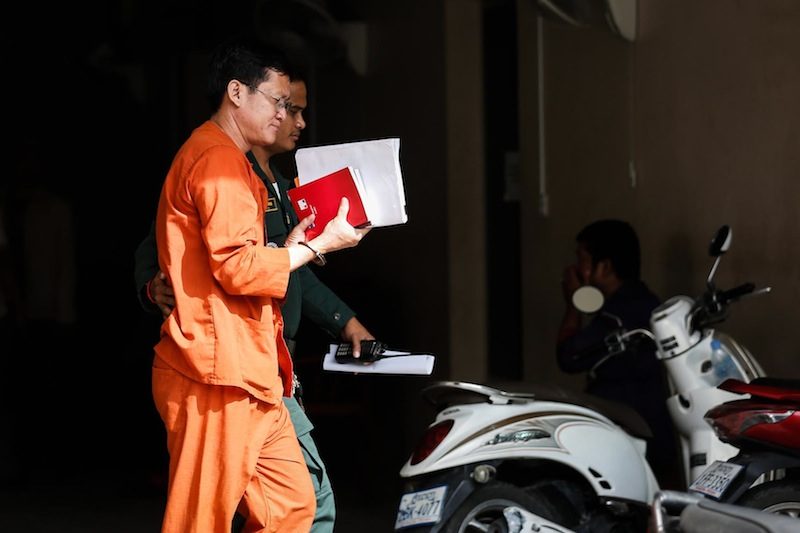The National Election Committee’s deputy secretary-general was sentenced on Thursday to six months in prison for criticizing court officials during previous work as a human rights campaigner, leaving “no doubt” that civil society is under threat, international observers said.
Ny Chakrya, the former head of monitoring for rights group Adhoc, was found guilty of “malicious denunciation” and “publication of commentaries intended to unlawfully coerce judicial authorities” related to comments critical of a prosecutor and judge at the Siem Reap Provincial Court. He was also fined 6 million riel, or about $1,500.

Appointed to the National Election Committee (NEC) in January, Mr. Chakrya was seen as a counterbalance to CPP leadership of the committee ahead of upcoming elections. He also faces charges related to the prosecution of deputy opposition leader Kem Sokha.
The Phnom Penh Municipal Court heard the defamation case for four hours on Thursday, going over the events of May 12 and 20 last year, when Mr. Chakrya held two news conferences denouncing the imprisonment of two Siem Reap farmers convicted of illegally clearing land in Varin district. Mr. Chakrya argued at the time that Siem Reap court deputy prosecutor Sok Keobandith and Investigating Judge Ky Rithy had improperly handled the farmers’ case and wrongly convicted them.
Under questioning by Presiding Judge Khy Chhay on Thursday, Mr. Chakrya denied having put pressure on the Siem Reap court or accusing the prosecutor and judge of corruption. “I only spoke about the illegal procedures of the arrests,” Mr. Chakrya said. “I didn’t threaten the court. What power do I have to threaten the court?”
He testified that during the second news conference, he said he would send a complaint to the Justice Ministry, Supreme Council of Magistracy and general prosecutor of the Court of Appeal.
“One of the three institutions, the general prosecutor of the Appeal Court, responded that this case had irregularities,” Mr. Chakrya said.
However, Judge Chhay told the court on Thursday that according to law, only the investigation chamber of the Appeal Court has the right to say that an arrest procedure is illegal.
“Holding a press conference to accuse the court is not right, and it affects the credibility and reputation of the court,” the judge said.
Deputy prosecutor Sieng Sok said that three days after Mr. Chakrya’s first news conference, the court sent a letter to him ordering him to stop criticizing the deputy prosecutor and investigating judge.
The fact that Mr. Chakrya held a second news conference anyway proves that he had “bad intentions…to affect the reputation of the court,” Mr. Sok said.
After the verdict came down on Thursday, Mr. Chakrya told reporters that he planned to appeal.
“We have no hope of justice when the institution of the court is unjust,” he said as he was escorted from the courtroom.
Hang Puthea, the NEC’s spokesman, said that if the verdict was implemented—meaning that appeals were denied—“Mr. Ny Chakrya cannot go back to work as the deputy secretary-general of the NEC.”
“We would regret losing an NEC official. We don’t want this to happen to any NEC officials,” Mr. Puthea said.
International observers slammed the verdict as a political attack on human rights.
“This verdict should eliminate any doubt that human rights and civil society are under threat in Cambodia today,” said Kingsley Abbott, senior international legal adviser for the International Commission of Jurists, who observed the trial.
“The conviction of Ny Chakrya for carrying out his important work as a human rights defender is a blow to Cambodian society as a whole as it will deter others who wish to speak out on behalf of victims of human rights violations from seeking justice,” he said in an email.
Wan-Hea Lee, country representative for the U.N. Office of the High Commissioner for Human Rights, said the trial was evidence that judicial reforms were urgently needed.
“Fair trials are guaranteed through the presentation and analysis of conclusive evidence, through sound legal reasoning in the judgement and respect for procedures that ensure equality of arms between the prosecution and defense,” Ms. Lee said.“These guarantees were not evident in today’s trial.”
Betty Yolanda, co-director at the Asian Forum for Human Rights and Development, which supervises advocacy work in Cambodia, implored the government to recognize the contributions that human rights defenders like Mr. Chakrya had made to the country. “Today’s verdict certifies that there is no place for dissent in Cambodia, where human rights defenders can be persecuted for doing their legitimate work,” Ms. Yolanda said in an email.
“Amidst the climate of fear in the society after the killing of Kem Ley, and the criminalisation of 5 human rights defenders, including Ny Chakyra, this sentence has a chilling effect on the enjoyment of fundamental freedoms in the country,” she wrote.
Mr. Chakrya and four senior Adhoc officers are being held in provisional detention for their alleged involvement in bribing a mistress of Mr. Sokha to deny the affair during questioning in a “prostitution” case. He was returned to Phnom Penh’s PJ prison after Thursday’s hearing.



